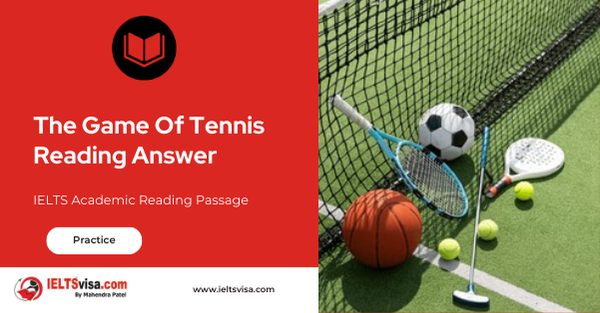The Game Of Tennis Reading Answer
IELTS Academic Reading Passage
A
Real Tennis as it is called in Britain, Royal Tennis as it is called in Australia, Court Tennis as it is called in the States, Jeu de Paume as it is called in France, or Tennis as it is properly known, is the oldest of all the racket games, and unlike most of the others, such as squash or lawn tennis, it is a product of evolution rather than pure invention.
B
The game started to form into something recognizable in the 11th century. It started as hand ball, played by monks around the cloisters of monasteries of Italy and France, much as schoolchildren do today in corners of their school playground. Gradually as monks travelled to other monasteries, more enjoyable rules were adopted, the more bizarre rules abandoned and people started to add features to their courtyards that improved the pastime, and demolish or modify others that detracted from it. The monks enjoyed the game so much that the Pope banned the playing of it, and by the 14th century the game had spread from cloister to castle and became a game of the nobility. There are other theories about the origins of the game. A tennis historian, Roger Morgan, has theorized that the game owes its origins to playing in medieval streets which is a nice idea but as the streets were also used as sewers, it couldn’t have been much fun.
c
The 16th and 17th centuries were the heyday of tennis. It was played by the nobility of France and Britain and there were reputedly 1800 courts in Paris alone at this time though a lot of these would have been quite ramshackle structures. In Britain the game flourished with royalty being famous players. King Henry VII was enthusiastic though not skilled but his son Henry VIII (more famous for his wives!) was an adept. Kings Charles I and II of England were both keen players and the game actually indirectly led to the death of King James I. One French king also died as the result of being hit by a tennis ball. Modern real tennis is virtually indistinguishable from the game played in those days.
D
Originally the game was played with the bare hand, later with a glove, then someone had the bright idea of attaching cord or tendons to the fingers. It was a short step from there to attaching these cords to a frame and adding a handle to make a racket. The ball, although similar in appearance to a lawn tennis ball is made with a core of cork, covered with cloth, tightly bound in string and covered in felt. The balls are all hand stitched and last about 2 weeks. This method has been used throughout history, although other substances such as hair or wool were used for the centre, and the balls were a good deal lighter.
E
The influence of real tennis can most clearly be seen in the Basque games known by the catchall name of pelota. There are various forms of pelota with different types of court, ball and racket, and there are forms which still uses the hand or even a basket type racket. Similarities can be seen in the court layout and rules. Probably most racket sports owe something to real tennis to some extent. Squash though derives from a game known as rackets which was developed in the debtor prisons of 17th and 18th century Britain.
F
As we have seen above, tennis of one kind or another has been played in France as far back as the 12th century. It was not until the late 19th century though that lawn tennis became popular. Major Walter Wingfield, in search of a more vigorous game than croquet for the leisure classes, devised an activity that was a hybrid of badminton and real tennis. He called it Sphairistike, Greek for ball games. In 1877 the All England Club held a tournament later to be known as Wimbledon. Eventually the game was modified from the prescriptions laid out by Major Wingfield. For instance Wingfield’s rules called for the game to be played on a court the shape of an hourglass. Soon it was played on a rectangular court. There have also been changes in the quality and type of clothing and equipment used. Early last century shorts were a radical idea. During the last few decades racket materials have radically changed with graphite and other compounds being used. Wooden rackets are now an anachronism, to the lament of the purists.
G
Nowadays there is a real tennis circuit as there is for lawn tennis. The top professionals are as fit and skilled as their lawn tennis counterparts if not as famous and well paid. Every court in the world has its own professional or professionals and these players travel round the world playing the top competitions as well as looking after their home courts. In fact real tennis is now probably played at a higher standard that at any other time in its history.
H
In the mid 19th century there was a renaissance in tennis and a flurry of court construction and the first courts were built in the US and Australia. Unfortunately the coming of the First World War cut short tennis’ re-emergence. Over the last 25 years tennis has again begun to grow. The modern costs of building the courts inhibits the growth a bit but new courts have been springing up in the US, France, Australia and the UK with talk of court construction going on in Holland, Russia and South Africa. The future again looks bright for real tennis.
Questions 28 – 34
The reading passage on The Game of Tennis has 8 paragraphs (A – H).
From the list of headings below choose the most suitable headings for paragraphs B – H
Write the appropriate number (i–xii) in boxes 28-34 on your answer sheet. NB There are more headings than paragraphs, so you will not use them all.
I. The Golden Age of Tennis
II. Modern Lawn Tennis
III. Court Construction Techniques
IV. The Different Names of Tennis
V. The Real Tennis Revival
VI. Tournament Tennis
VII. Tennis During the War
VIII. Early Development
IX. Other Descendants of Tennis
X. Tennis and the Pope
XI. Tennis Equipment
XII. Tennis and Prisons
|
28………………… |
Paragraph |
B |
|
29………………… |
Paragraph |
C |
|
30………………… |
Paragraph |
D |
|
31………………… |
Paragraph |
E |
|
32………………… |
Paragraph |
F |
|
33………………… |
Paragraph |
G |
|
34………………… |
Paragraph H |
Questions 35 – 40
Below you will find a summary of The Game of Tennis. Complete the summary using words from the box below the summary and write them in boxes 35 – 40 on your answer sheet.
NB There are more words than spaces, so you will not use them all.
Example Answer
An ancient game, tennis has had (eg) names in different countries. various
An ancient game, tennis has had (eg) names in different countries. The game started in Italy and France and the rules 35…………………… into the game played today. The most 36………………… period of play was about four to five hundred years ago with hundreds of courts in use, albeit some rather 37……………… Royalty were enthusiastic players including several kings. Equipment is much the same today as hundreds of years ago and although some materials have changed, balls and other equipment are still made by hand. Tennis has 38……………….. the development of other games including Basque pelota and the more recognisable lawn tennis. The “new” tennis has become much more well known and has revolutionised equipment. Today the “old” form of tennis is enjoying a 39………………………. with a professional tournament circuit and competitions played around the world and new courts are appearing despite high 40………………. costs.
playing popular fantastic constructionplayed insurance developedvarious desirable hindered resurgenceinterest dilapidatedinfluenced rested

Solution For: The Game Of Tennis Reading Answer
28. viii 35. developed
29. i 36. fantastic
30. vi 37. dilapidated
31. ix 381. influenced
32. vi 39. resurgence
33. v 40. construction
34. vii
Review and Practice
- Regularly practice with IELTS reading samples and time yourself to get used to the pressure of the exam.
- Review your mistakes to understand where you went wrong and how to avoid similar errors in the future.
Our Books
Master IELTS Speaking Part 1
IELTS Writing Task 1 Book
IELTS Writing Task 2 Book
The Game Of Tennis Reading Answer Explanation
Comin Soon
Practice IELTS Other Modules
IELTS Listening
The IELTS Listening test assesses how well you can understand spoken English in various contexts. It lasts about 30 minutes and is divided into four sections with a total of 40 questions. The listening tasks become increasingly difficult as the test progresses.
IELTS Academic Reading
The IELTS Academic Reading section assesses your ability to understand and interpret a variety of texts in academic settings. It is designed to evaluate a range of reading skills, including skimming for gist, reading for main ideas, reading for detail, understanding inferences, and recognizing a writer's opinions and arguments.
IELTS Speaking
The IELTS Speaking test assesses your ability to communicate in English on everyday topics. It lasts 11-14 minutes and consists of three parts: introduction, cue card, and a discussion based on the cue card topic.
IELTS General Reading
IELTS General Reading tests your ability to understand and interpret various types of texts. Here are some key areas and types of content you can expect to encounter in the reading section, along with tips for effective preparation.
IELTS Academic Writing Task 1
In IELTS Academic Writing Task 1, you are presented with a visual representation of information, such as graphs, charts, tables, or diagrams, and you are required to summarize, compare, or explain the data in your own words.
IELTS General Writing Task 1
In IELTS General Writing Task 1, you are required to write a letter based on a given situation. The letter can be formal, semi-formal, or informal, depending on the prompt. Here’s a breakdown of the key components to include in your letter
IELTS Academic Writing Task 2
In IELTS Academic Writing Task 2, you are required to write an essay in response to a question or topic. Here’s a guide to help you understand the essential elements of this task
IELTS Exam Tips
To succeed in the IELTS exam, practice regularly, familiarize yourself with the test format, improve your vocabulary, develop time management skills, and take mock tests to build confidence.
Grammer for IELTS
Grammar is the foundation of effective communication in English. Understanding tense usage, subject-verb agreement, and sentence structure enhances clarity and coherence in writing and speaking.
Vocabulary for IELTS
Vocabulary plays a crucial role in the IELTS (International English Language Testing System) exam, especially in the Speaking and Writing sections. Here’s an overview of why vocabulary is important and how it impacts your performance
RECENT IELTS SAMPLES QUESTIONS AND ANSWERS
Walking with dinosaurs
Peter L. Falkingham and his colleagues at Manchester University are developing techniques that...
Money as the Unit of Amount Reading Answers
The most difficult aspect of money to understand is its function as a unit of account. In...
WEATHERING IN THE DESERT
In the deserts, as elsewhere, rocks at the earth's surface are changed by weathering, which...
Nature on Display in American Zoos
The first zoo in the United States opened in Philadelphia in 1874, followed by the Cincinnati...
Can We Prevent the Poles From Melting
Such is our dependence on fossil fuels, and such is the volume of carbon dioxide we have...
Air conditioning the earth reading answers
The circulation of air in the atmosphere is activated by convection, the transference of heat...













